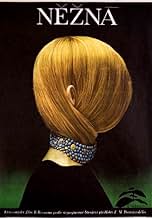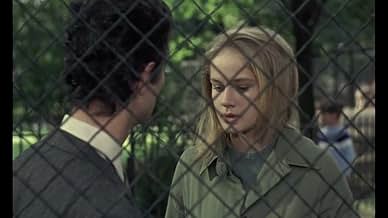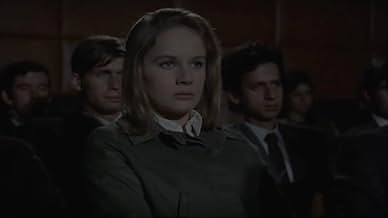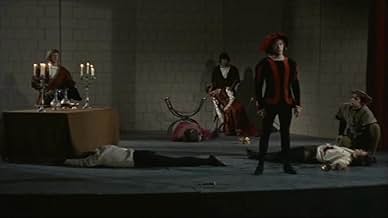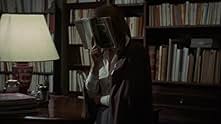IMDb-BEWERTUNG
7,3/10
3236
IHRE BEWERTUNG
Eine Frau bringt sich um und hinterlässt ihrem trauernden Ehemann keine Erklärung. Wir erfahren in Rückblenden, wie sie sich kennen gelernt und geheiratet haben und wie es ihr nicht gelungen... Alles lesenEine Frau bringt sich um und hinterlässt ihrem trauernden Ehemann keine Erklärung. Wir erfahren in Rückblenden, wie sie sich kennen gelernt und geheiratet haben und wie es ihr nicht gelungen ist, ihren Lebensstil an seinen anzupassen.Eine Frau bringt sich um und hinterlässt ihrem trauernden Ehemann keine Erklärung. Wir erfahren in Rückblenden, wie sie sich kennen gelernt und geheiratet haben und wie es ihr nicht gelungen ist, ihren Lebensstil an seinen anzupassen.
- Regie
- Drehbuch
- Hauptbesetzung
- Auszeichnungen
- 1 wins total
Empfohlene Bewertungen
The nail in the coffin in this extraordinary film is very similar to the burnt out stake at the end of Bresson's 'The Trial of Joan of Arc'. It says quite simply, this is the end, it is finished. The tortured soul of the woman played to perfection by Dominique Sanda seeks a finality to her suffering, and her combat with the world. She has had enough of material values and struggles, and like any inwardly imprisoned soul, she achieves her release. The playing time of the film is short but it contains many images of the world surrounding her; a visit to a cinema and a mediocre film on the screen, watching a performance of 'Hamlet', giving too much money away in her pawnbroker husband's shop. She does not relate to this, and her husband, brilliantly acted by Guy Frangin, tries to tame her into accepting the ways of a selfish, money orientated world. She states clearly she is not concerned with money, and as far as I can see she marries out of a sense of despair and not love, perhaps knowing that her husband will push her to the limit of endurance and give her the strength to execute herself. As in the Joan of Arc story, she is resigned to execution as the only way out of an existence she cannot understand. For Elle (which literally means she) her husband will be her executioner, not by intent, but by simply being the very opposite to her with his soiled humanity. She aims a gun at his head and Sanda's eyes say it all. For a moment she wants to kill her killer, but knows by putting down the gun that she is the one to be killed, and that person can only be herself. As for the film itself, only Bresson could have made it, with his austere vision of the human hell we live in. Watch 'The Devil, Probably' and 'Mouchette' to see that only the killing of the body we inhabit can save us. A negative interpretation? I have no idea. It is just what I saw in this great and seldom seen film. I have a poor copy of it and it is a disgrace that unlike most of Bresson's films this one is so hard to find. It is up there with the finest he made, and his use of muted colour only enhances the trivialities and the transience of Paris in 1969. That Paris has gone, but a Paris with even more materialism has taken its place. For those who recall the city 50 years ago, it is moving to see a once celebrated bookshop 'La Hune' sandwiched between two cafes of literary repute, and to see the same place now transformed into an excess of empty luxury goods and even more monetary values. Elle in 'Une Femme Douce' would I believe sacrifice herself again.
This movie Is sort of not what I expected From Robert Bresson.It was his first color film and is not as intense as his earlier films.Thou deals with the themes of grace and suicide(his trademarks)in an obtrusive style.'A Gentle Woman' is definitely a very underappreciated movie.If you like him you should search for it a your local video store.I didn't understand the movie when i first saw it,but it improves greatly after a few viewings.
Like Mouchette Bresson's earlier film revolves around the mystery of a waif. No one can grasp her true needs only desire her and unwittingly destroy her. The film has several key occurrences that appear to happen by chance. The male lead, the waif's husband, when searching for her on an dimly lit street says to himself "why did I choose to go this way?" and as if by premonition runs into his wife who seated in a car with someone that we, the viewer, and the husband never get to see.
This is Bresson's first film in color and is exquisitely photographed by Ghislain Cloquet in mostly muted tones with each scene containing some object that is the color green. A symbol for money? Perhaps, I don't know if that symbolic color is the same for the French. Also, as in the film Mouchette, the recurring sounds of street traffic occur throughout the film. A motif for the continual monotony of life? I decidedly don't know or understand what this film means but as you can see I'm obsessed with trying to figure it out. And like the husband in the film I was drawn to endure it because of the enchanting Dominique Sanda.
Let me just say I am not a fan of Bresson's. His complete indifference to credible, believable acting, sometimes works for the movie, sometimes against it. In this one, the wooden deliverance of every single line ends up very distracting.
To top that, if you start noticing how much screen time is spent depicting the characters opening and closing doors, the movie becomes unintentionally funny beyond words. Has to be seen to be believed.
To top that, if you start noticing how much screen time is spent depicting the characters opening and closing doors, the movie becomes unintentionally funny beyond words. Has to be seen to be believed.
Bresson is one of the great artists of cinema. Une femme douce a masterpiece and probably his most satisfying film.
Une femme douce is enigmatic, subtle, full of ellipses and misunderstandings. It is a moving analysis of the loneliness of a marriage and the unsatisfactory human condition: on the one hand there is blindness to reality, and on the other the intuition of a need and an impossibility to transcend that artificial reality that we construct for ourselves.
The characters are locked in a life of sufficient economic relief, in a complacent conformity that suffocates the young woman. The film narrates this chronic dissatisfaction with a life that is reduced to systematically improving material conditions.
Without stridency, without effects, with profound humility, Bresson's style was never more suitable, never more static and transcendent than in this film of two solitary beings: a man locked in his own prison and a woman caged in the golden cage of economic security.
The first scene shows us the girl's suicide in a static and unforgettable shot: the table that seems to collapse eternally on the balcony indicates that the girl has just jumped into the void and at the same time gives the sensation of an unfinished action, which It seems to stop in time.
Next the husband remembers before the corpse how he met her, fell in love with her, and saved/bought her.
The girl has had a past of economic hardship, of squalor; the boy has had a setback that has taught him how fragile prosperity is.
There is something of a hunted and trapped beast in Sanda's gaze. From there everything is mystery and conjecture in the marriage relationship.
Une femme douce is the great leap in Bresson's style towards his final maturity, that of works in color. Afterwards there will be no substantial purges.
I only have one scene left over: that awful representation of Hamlet, with its subsequent commentary, seems like a declaration of principles, an aesthetic creed enunciated without any elegance. An incomprehensible beginner's mistake in an author in full maturity.
Une femme douce is enigmatic, subtle, full of ellipses and misunderstandings. It is a moving analysis of the loneliness of a marriage and the unsatisfactory human condition: on the one hand there is blindness to reality, and on the other the intuition of a need and an impossibility to transcend that artificial reality that we construct for ourselves.
The characters are locked in a life of sufficient economic relief, in a complacent conformity that suffocates the young woman. The film narrates this chronic dissatisfaction with a life that is reduced to systematically improving material conditions.
Without stridency, without effects, with profound humility, Bresson's style was never more suitable, never more static and transcendent than in this film of two solitary beings: a man locked in his own prison and a woman caged in the golden cage of economic security.
The first scene shows us the girl's suicide in a static and unforgettable shot: the table that seems to collapse eternally on the balcony indicates that the girl has just jumped into the void and at the same time gives the sensation of an unfinished action, which It seems to stop in time.
Next the husband remembers before the corpse how he met her, fell in love with her, and saved/bought her.
The girl has had a past of economic hardship, of squalor; the boy has had a setback that has taught him how fragile prosperity is.
There is something of a hunted and trapped beast in Sanda's gaze. From there everything is mystery and conjecture in the marriage relationship.
Une femme douce is the great leap in Bresson's style towards his final maturity, that of works in color. Afterwards there will be no substantial purges.
I only have one scene left over: that awful representation of Hamlet, with its subsequent commentary, seems like a declaration of principles, an aesthetic creed enunciated without any elegance. An incomprehensible beginner's mistake in an author in full maturity.
Wusstest du schon
- WissenswertesRobert Bresson chose Dominique Sanda just as a result of her first voice call.
- Patzer(at about 18 minutes) Guy and Dominique swap places in their cinema seats before they are actually seen to do so in the final shot of that scene.
Top-Auswahl
Melde dich zum Bewerten an und greife auf die Watchlist für personalisierte Empfehlungen zu.
- How long is A Gentle Woman?Powered by Alexa
Details
Box Office
- Weltweiter Bruttoertrag
- 2.356 $
- Laufzeit1 Stunde 28 Minuten
- Sound-Mix
- Seitenverhältnis
- 1.66 : 1
Zu dieser Seite beitragen
Bearbeitung vorschlagen oder fehlenden Inhalt hinzufügen


